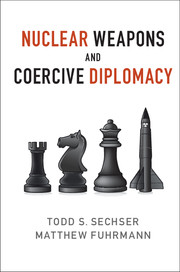Book contents
- Frontmatter
- Dedication
- Contents
- List of Tables
- List of Figures
- Acknowledgements
- Part I The Logic of Nuclear Skepticism
- Part II Trends
- Roadmap for Part II
- 3 Standoffs: Nuclear Weapons in Crisis Bargaining
- 4 Stalemates: Territorial Disputes and Nuclear Politics
- Part III Cases
- Part IV Conclusions
- Appendix: Methods and Data
- References
- Index
Roadmap for Part II
from Part II - Trends
Published online by Cambridge University Press: 16 February 2017
- Frontmatter
- Dedication
- Contents
- List of Tables
- List of Figures
- Acknowledgements
- Part I The Logic of Nuclear Skepticism
- Part II Trends
- Roadmap for Part II
- 3 Standoffs: Nuclear Weapons in Crisis Bargaining
- 4 Stalemates: Territorial Disputes and Nuclear Politics
- Part III Cases
- Part IV Conclusions
- Appendix: Methods and Data
- References
- Index
Summary
Do nuclear weapons provide states with coercive advantages in world politics? The nuclear coercionist school suggests that atomic bombs do, in fact, give their owners political leverage. Nuclear skepticism theory, by contrast, contends that they do not. Which of these views is correct?
There are two main ways that we could find out. First, we could look at serious nuclear crises – like, for example, the Cuban missile crisis – and assess whether nuclear weapons helped states achieve more favorable settlements. Many seminal books on nuclear diplomacy take this approach. But there is a second possibility: we could examine a large number of cases, including nonnuclear crises, to determine whether states with nuclear weapons fare better in diplomacy than their nonnuclear counterparts.
In this latter approach, nuclear weapons are analogous to a “treatment” in a randomized experiment. Imagine, for the sake of illustration, that a medical researcher wanted to know whether a particular drug could cure cancer. The scientist might randomly assign the drug to some cancer patients and give others a placebo. She could then compare the degree to which cancer progressed in both groups of patients as time passed. If people who received the drug showed greater improvement, on average, than those who got the placebo, she might reasonably conclude that the treatment is effective.
In the study of nuclear weapons, the possession of nuclear weapons might be considered equivalent to the drug in a pharmaceutical study: by comparing states that possess them to states that do not, we can begin to discover whether nuclear weapons offer coercive benefits to their owners. Of course, we cannot perfectly replicate this kind of study when evaluating the political effects of nuclear weapons – it is neither realistic nor desirable to randomly give atomic bombs to some states and not others. We can, however, follow the same basic intuition to assess the role of nuclear weapons in world politics.
We adopt both methodological approaches in this book. Part II uses statistical analysis to identify general trends in coercive diplomacy. We assess, in particular, whether nuclear states make more effective coercive threats (Chapter 3) or achieve better territorial dispute settlements (Chapter 4) than nonnuclear states.
- Type
- Chapter
- Information
- Nuclear Weapons and Coercive Diplomacy , pp. 63 - 71Publisher: Cambridge University PressPrint publication year: 2017



